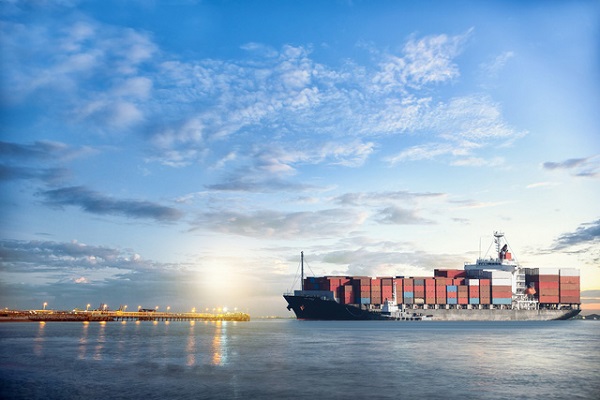Logistics services are considered as one of the economic sectors that suffered the most in COVID-19 season, due to the “frozen” foreign trade.
However, businesses in the industry are still focusing on restructuring to be ready to exploit and make full use of all opportunities provided in the post-epidemic period.
According to the Vietnam Association of Logistics Services Enterprises (VLA), logistics activities such as transportation are reduced due to the obstructed customs clearance, warehouse and freight services are also severely affected. Other problems such as some Chinese customers having financial difficulties led to the inability to pay debts to shippers and Vietnamese suppliers, leading to the late payment of goods to logistics enterprises.
Paralysis because foreign trade “froze”
With shipping, major routes from China, Korea, Japan, shipping lines such as ONE, HMM and some other shipping lines reduce the number of vessels connecting all routes, affecting the shipping schedule and quality. amount of service. Most imports on routes to Vietnam plummeted, some other markets were strictly quarantined. Operating procedures from Asian markets and some other regions are slower than usual.
For air routes, airlines now cancel flights to China, South Korea, and Hong Kong, while minimizing flights from the translated region. In addition, freight rates rise higher than normal. Meanwhile, border routes are difficult to find shipping providers. The decrease in cargo volume leads to a 30% reduction in road transport demand.
Le Duy Hiep, Chairman of the Vietnam Association of Logistics Services Enterprises (VLA), said that depending on the type of service, the decline in activities and revenue. Air transport services and road are most affected. “About 80% of the Association’s members are micro, small and medium-sized businesses, so many businesses are at risk of stopping all operations; many workers will be laid off and lose their jobs if the pandemic persists, ”said Mr. Le Duy Hiep.
However, there are also logistics enterprises that know how to choose the advantages to overcome Covid-19. For example, HNT Forwarding and Trading Co., Ltd mainly works on export consignment for export orders to China. Due to the slow road transport, many businesses have flocked to the sea, which makes the company’s orders soar. Ms. Nguyen Thi Thao Ngan, Director of HNT Company, said that compared to the same period last year, the number of orders for shipping increased to 200 – 300 containers / month, even a month increased to thousands of containers.
The main strength of enterprises when doing logistics services is agricultural products and fruits. According to Ngan, this is an essential consumer goods, so the purchasing power is still maintained, because the agricultural companies still have orders to export, the forwarding and shipping services of this item are also more stable. compared to industries such as machinery, equipment …
Do not issue surcharges
Facing complicated movements of the epidemic, VLA has proposed to the Government some solutions to remove difficulties for logistics enterprises. The first is the proposal on debt rescheduling and tax payment which has been initially removed by the Government through the Government’s Decree 41/2020 / ND-CP on extending the deadline for paying tax and land rent. In addition, recommendations on reducing petrol and oil prices have also promoted very positive effects on logistics enterprises in particular and the whole economy in general.
Most recently, the Vietnam Maritime Administration has decided to reduce the price of pilotage services for Vietnamese shipping businesses operating on domestic routes by 10% due to the impact of Covid-19, the time to reduce the price in 3 months since May 1, 2020. This is really good news for logistics businesses in the current difficult situation.
In order to be ready for the recovery and development of foreign trade and logistics services in the post-service period, VLA is actively developing action plans of logistics service providers, focusing on three main issues as the source. financing for business, promoting service delivery activities and stabilizing workers’ lives.
In order to create a basis for the recovery of enterprises, VLA wants the Government to instruct ministries and sectors to take measures to support businesses. Specifically, reduce the fees of seaports, airports to 50%, or free use of port structures; 20-30% reduction of BOT and highway tolls for freight vehicles within 6 months to 1 year; 30% discount on vehicle testing fees.
The Ministry of Transport and the Ministry of Finance should take measures to control foreign container shipping lines, not to issue surcharges, surcharges and freight charges within 6 months after the epidemic ends. Strictly control ports, do not increase the cost of container-lifting, loading and unloading, warehousing to support export enterprises.
In addition to the support from the authorities, logistics enterprises themselves should also focus on cutting administrative spending, strengthening international cooperation, finding new markets, limited or not dependent much. into the market, traditional customers.
In addition, businesses also need to take full advantage of opportunities from the next-generation Free Trade Agreement, especially the Vietnam-European Union Free Trade Agreement (EVFTA). “Because this Agreement will help increase the demand for logistics services and have a significant impact on the market prospects as well as Vietnam’s logistics industry,” Mr.Hiep said.




